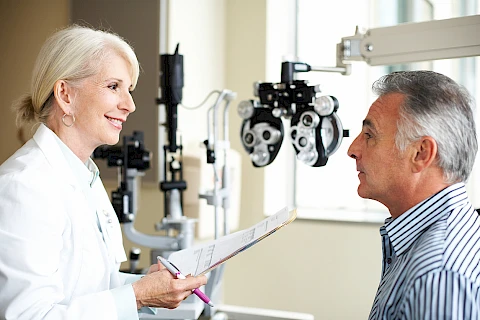
August is National Eye Exam Month, a perfect reminder of the importance of regular eye exams, especially for seniors. As people age, they become more susceptible to eye conditions such as cataracts, glaucoma, and age-related macular degeneration. As a caregiver, you play a key role in ensuring that your senior loved one is well-prepared for their eye doctor visits. Here’s a guide to help you get ready.
The Need for Regular Eye Exams
One of the main benefits of regular eye exams is detecting early signs of eye conditions such as glaucoma, cataracts, and macular degeneration. Catching these issues early can significantly improve treatment and outcomes.
Maintaining overall health goes hand in hand with regular eye exams. Poor vision can lead to falls, injuries, and a decline in quality of life. Routine eye exams can prevent vision loss, and help manage related complications, keeping seniors healthy and independent.
Gathering Essential Information
Before the appointment, gather all relevant medical information. This includes:
- Medical History: Provide a complete medical history, including past eye conditions or surgeries, chronic illnesses (such as diabetes or hypertension), and any family history of eye diseases. This information helps the eye doctor understand potential risk factors and tailor the exam to the senior’s needs.
- Current Medications: Make a list of all current medications, including prescription drugs, over-the-counter medications, and supplements. Some medications can affect vision or interact with eye treatments, so it’s important for the doctor to have this information.
- Vision Concerns: Note any specific vision concerns your loved one has been experiencing, such as blurred vision, difficulty reading, sensitivity to light, or changes in peripheral vision. Keep track of when these issues started and how they have progressed.
Preparing for the Appointment
Once you've gathered all the necessary information, it's time to prepare for the actual appointment. Choose a convenient time to ensure it's as stress-free as possible, and make arrangements for transportation to and from the appointment.
Be sure to bring the list of medications and the medical history you've prepared. Don't forget the insurance information and identification, as these are often required for the appointment.
Prepare a list of questions to ask the eye doctor. Clarify any concerns you might have and make sure you understand the proposed treatment plan. Questions such as "What are the side effects of the medication?" or "How often should we schedule follow-up exams?" can be very helpful.
Advocating for Your Loved One's Eye Health
Make sure you communicate clearly with healthcare providers. This ensures that they have all the information they need to provide the best possible care. Don't forget to schedule any follow-up appointments that the eye doctor recommends. Consistent care is key to maintaining eye health.
Encourage your loved one to practice healthy eye habits at home. This includes a balanced diet, wearing sunglasses outside, and proper lighting for reading and other activities.
Senior Helpers Provides Support for Senior Eye Health
Preparing for senior eye doctor visits is important for maintaining good eye health. By gathering the right information, preparing for the appointment, and advocating for your loved one's care, you can help ensure they receive the best possible eye care.
If you need assistance with senior care services, contact us at Senior Helpers Phoenixville. We're here to help families in Norristown, King of Prussia, Phoenixville, Pottstown, and throughout Montgomery County.